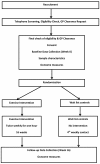Study protocol: a randomised controlled trial of the effects of a multi-modal exercise program on cognition and physical functioning in older women
- PMID: 23009189
- PMCID: PMC3503610
- DOI: 10.1186/1471-2318-12-60
Study protocol: a randomised controlled trial of the effects of a multi-modal exercise program on cognition and physical functioning in older women
Abstract
Background: Intervention studies testing the efficacy of cardiorespiratory exercise have shown some promise in terms of improving cognitive function in later life. Recent developments suggest that a multi-modal exercise intervention that includes motor as well as physical training and requires sustained attention and concentration, may better elicit the actual potency of exercise to enhance cognitive performance. This study will test the effect of a multi-modal exercise program, for older women, on cognitive and physical functioning.
Methods/design: This randomised controlled trial involves community dwelling women, without cognitive impairment, aged 65-75 years. Participants are randomised to exercise intervention or non-exercise control groups, for 16 weeks. The intervention consists of twice weekly, 60 minute, exercise classes incorporating aerobic, strength, balance, flexibility, co-ordination and agility training. Primary outcomes are measures of cognitive function and secondary outcomes include physical functioning and a neurocognitive biomarker (brain derived neurotrophic factor). Measures are taken at baseline and 16 weeks later and qualitative data related to the experience and acceptability of the program are collected from a sub-sample of the intervention group.
Discussion: If this randomised controlled trial demonstrates that multimodal exercise (that includes motor fitness training) can improve cognitive performance in later life, the benefits will be two-fold. First, an inexpensive, effective strategy will have been developed that could ameliorate the increased prevalence of age-related cognitive impairment predicted to accompany population ageing. Second, more robust evidence will have been provided about the mechanisms that link exercise to cognitive improvement allowing future research to be better focused and potentially more productive.
Trial registration: Australian and New Zealand Clinical Trial Registration Number: ANZCTR12612000451808.
Similar articles
-
The effects of multimodal exercise on cognitive and physical functioning and brain-derived neurotrophic factor in older women: a randomised controlled trial.Age Ageing. 2014 Sep;43(5):623-9. doi: 10.1093/ageing/afu010. Epub 2014 Feb 18. Age Ageing. 2014. PMID: 24554791 Clinical Trial.
-
The effects of a protein enriched diet with lean red meat combined with a multi-modal exercise program on muscle and cognitive health and function in older adults: study protocol for a randomised controlled trial.Trials. 2015 Aug 8;16:339. doi: 10.1186/s13063-015-0884-x. Trials. 2015. PMID: 26253520 Free PMC article. Clinical Trial.
-
SYNERGIC TRIAL (SYNchronizing Exercises, Remedies in Gait and Cognition) a multi-Centre randomized controlled double blind trial to improve gait and cognition in mild cognitive impairment.BMC Geriatr. 2018 Apr 16;18(1):93. doi: 10.1186/s12877-018-0782-7. BMC Geriatr. 2018. PMID: 29661156 Free PMC article. Clinical Trial.
-
The effects of physical activity and exercise on brain-derived neurotrophic factor in healthy humans: A review.Scand J Med Sci Sports. 2014 Feb;24(1):1-10. doi: 10.1111/sms.12069. Epub 2013 Apr 22. Scand J Med Sci Sports. 2014. PMID: 23600729 Review.
-
Copenhagen Consensus statement 2019: physical activity and ageing.Br J Sports Med. 2019 Jul;53(14):856-858. doi: 10.1136/bjsports-2018-100451. Epub 2019 Feb 21. Br J Sports Med. 2019. PMID: 30792257 Free PMC article.
Cited by
-
Low-intensity daily walking activity is associated with hippocampal volume in older adults.Hippocampus. 2015 May;25(5):605-15. doi: 10.1002/hipo.22397. Epub 2014 Dec 26. Hippocampus. 2015. PMID: 25483019 Free PMC article. Clinical Trial.
-
Relationships between cardiorespiratory fitness, hippocampal volume, and episodic memory in a population at risk for Alzheimer's disease.Brain Behav. 2017 Feb 17;7(3):e00625. doi: 10.1002/brb3.625. eCollection 2017 Mar. Brain Behav. 2017. PMID: 28293467 Free PMC article.
-
Effects of non-pharmacological or pharmacological interventions on cognition and brain plasticity of aging individuals.Front Syst Neurosci. 2014 Sep 2;8:153. doi: 10.3389/fnsys.2014.00153. eCollection 2014. Front Syst Neurosci. 2014. PMID: 25228860 Free PMC article. Review.
-
Functional fitness benchmark values for older adults: a systematic review.Front Public Health. 2024 Mar 21;12:1335311. doi: 10.3389/fpubh.2024.1335311. eCollection 2024. Front Public Health. 2024. PMID: 38577282 Free PMC article.
-
Study Protocol on Hormonal Mediation of Exercise on Cognition, Stress and Immunity (PRO-HMECSI): Effects of Different Exercise Programmes in Institutionalized Elders.Front Public Health. 2016 Jun 27;4:133. doi: 10.3389/fpubh.2016.00133. eCollection 2016. Front Public Health. 2016. PMID: 27446898 Free PMC article.
References
-
- Caracciolo B, Palmer K, Monastero R, Winblad B, Bäckman L, Fratiglioni L. Occurrence of cognitive impairment and dementia in the community: a 9-year-long prospective study. Neurology. 2008;70(19 Pt 2):1778–1785. - PubMed
Publication types
MeSH terms
Substances
LinkOut - more resources
Full Text Sources
Medical


